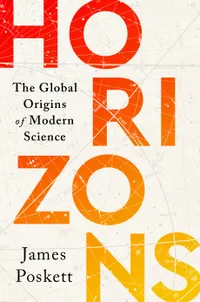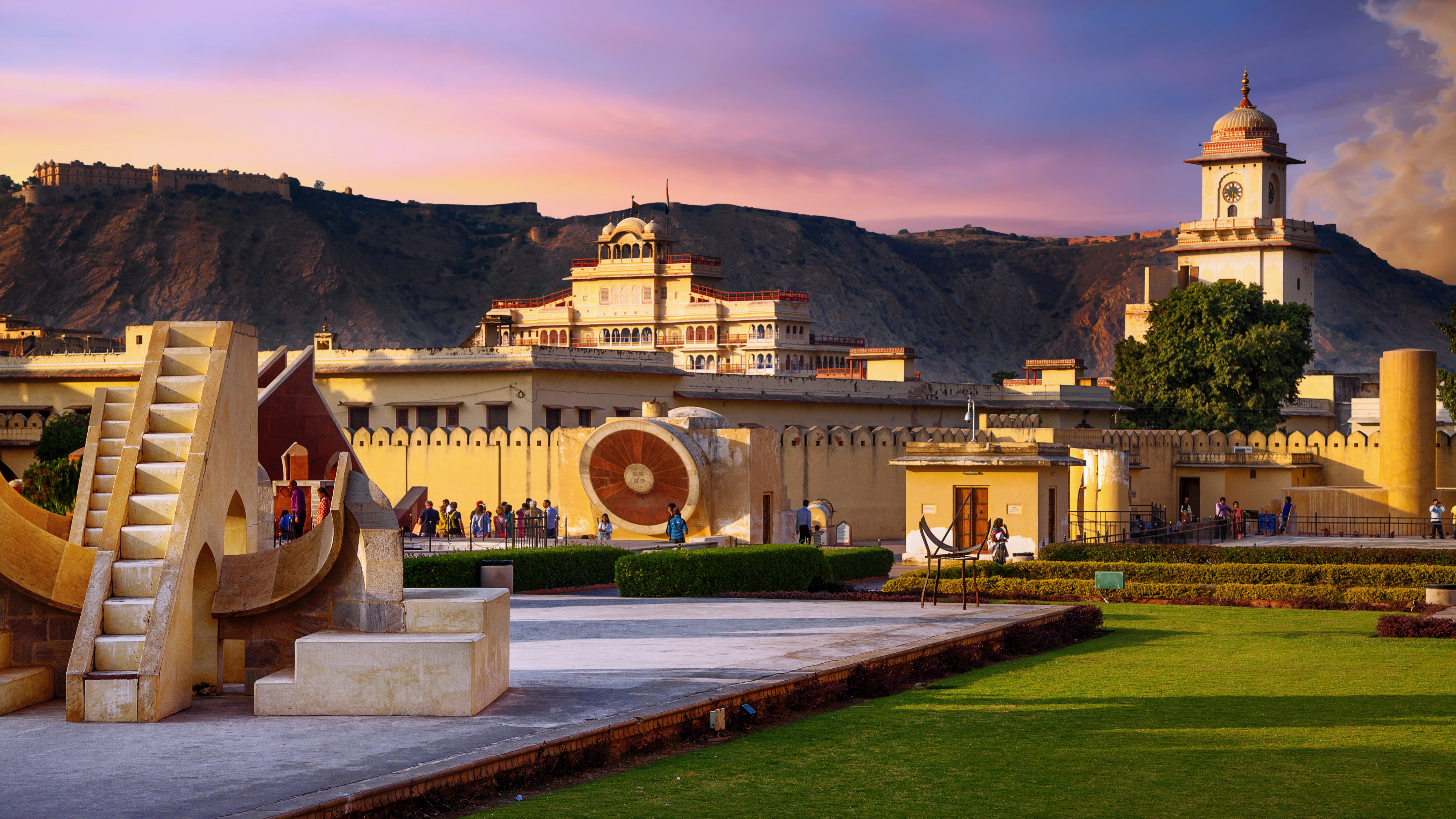In 'Horizons,' a discarded global view of science shines
What if everything we're taught about the history of astronomy and physics is wrong?

What if everything we're taught about the history of astronomy and physics is wrong?
In his new book, "Horizons: The Global Origins of Modern Science" (Mariner Books, 2022), James Poskett, a historian of science and technology at the University of Warwick in the United Kingdom, focuses on how science has always been a global endeavor and how that story was overshadowed by a biased Westernized version. Although the book spans several scientific fields, astronomy and physics play key roles in the story he tells, with cameos from key figures such as Ptolemy and Isaac Newton.
Space.com sat down with Poskett to discuss his new book and the insight it offers into the history of astronomy and physics. This interview has been edited for length and clarity.
Related: Best space books for 2022
Horizons: The Global Origins of Modern Science
Mariner Books, 2022 | $24.66 on Amazon
A historian of science busts the myth that modern science is a product of the Western world.
Space.com: How did the book come about?
James Poskett: I trained as a historian of science and became very frustrated and slightly angry, I guess, at the version of the history of science that I'd been taught that was extremely Eurocentric. I was much more interested in thinking critically about globalization, and also thinking quite critically about things like anti-racism, the legacies of slavery, the legacies of empire. That led me to want to write a book that much more directly addresses those concerns and speaks to the concerns of present science and technology.
Space.com: Can you talk about how you decided to structure the book?
Breaking space news, the latest updates on rocket launches, skywatching events and more!
Poskett: The book is a celebration of scientists from around the world, for sure. You read the book, you learn lots about individuals, their lives. But I didn't just want it to be a laundry list of people who were forgotten; I wanted it to be this bigger narrative. And so the organization reflects that bigger argument that to understand the history of science and, indeed, to understand science today, we need to think in terms of world historical change. I think framing the organization of the book around that helps the reader follow along. When they're reading about an individual, they're also aware that that person is part of this bigger cultural and political shift that's happening at the time.
Space.com: How did you go about deciding which examples to include in the book?
Poskett: Partly, it was just a question of balance: I could have written every chapter about China quite easily. There are stories to be told about every period in China — and similarly, for many other places — so it was making sure that as you go through the book, there's this balance of examples.
The book presents science as part of world history, but also as the product of individual lives. I wanted to bring out the texture of these people's lives: what they did, how they felt, what kind of struggles they were dealing with. That often determined who I picked, because I needed the detail. It was all very well, knowing that someone made a scientific contribution and they had some fancy equation, but on its own, that's not too interesting for the general public.
Space.com: Any incidents you loved but ended up needing to cut?
Poskett: I think the one thing that I didn't include, just because of structure and space, is the dispute between Galileo and the Jesuit astronomers who had gone to China. ... It's very easy when you write a book like this to be tempted to start with the people you know, but the whole point of the book is to get away from that. So Galileo basically isn't in the book. Lots of other famous people are, but I thought, "If I'm going to cut someone and I'm writing a book like this, I should cut Galileo, not the people you've not heard of."
Space.com: Are there any key examples that stand out to you from the chapters relating to astronomy and physics?
Poskett: There's two really important moments for the history of space — one earlier, one later.
The earlier one is the history of the understanding of the solar system in the Renaissance period. I show that the people who we usually associate with that important change — people like the Polish astronomer Nicolaus Copernicus — were really heavily reliant on, and quite happy to acknowledge, the fact that they were drawing on earlier, and also contemporary, ideas coming from the Islamic world.
How you put the sun at the center and model the planets — that's a history that you can't just tell from the perspective of Europe or indeed the Christian world. That's a story that stretches to places like Persia. In the same chapter, I talk about the advanced astronomical observations made by astronomers in the Ottoman Empire and Istanbul, astronomers in the Songhai Empire in what's today modern Mali and Timbuktu, and particularly the astronomers and mathematicians at the court of Jai Singh II in Mughal India, where there's these incredible observatories that you can still go to.
It's not saying that Copernicus wasn't important; of course he was. But there was this whole world of astronomical knowledge that was being blended together, in particularly the 16th and 17th centuries, that gave us what is really the basis of modern astronomy.
There's another key phase in the early 20th century, when you're getting the use of new ideas from special and general relativity and quantum mechanics. This isn't a story just of European and American astronomers and astrophysicists; this is very much a story that scientists from around the world are involved in.
One example is an Indian scientist called Meghnad Saha, who was born in what then was part of British India. He is particularly known today for something called the Saha ionization equation. This was an equation, effectively, to be able to determine the chemical composition of stars from their spectra. He doesn't feature much in the mainstream history of science, because he was marginalized at the time — partly because he was Indian, so there was a history of racism here, but also because he actually was actively opposing the colonial government.
In addition to his own research, he helped translate Einstein's works from German into English in India because he sees that as part of the new world, as a way to break the shackles of this old, imperial Victorian world in which he was born. He sees quantum mechanics and general relativity as a way to break with the past. So there's a kind of connecting up with his radical politics and his radical but extremely important scientific ideas.
Space.com: Of the traveling you did to research the book, what experience stood out to you the most?
Poskett: I think the Jantar Mantar stood out the most to me, a series of observatories across north India that were built by this Indian ruler, Jai Singh II. The one in Jaipur is the most famous. It's the biggest; it's spectacular; it's built out of this red sandstone; it's the most impressive. They're stone instruments, mainly, with metal attachments for various things. The scale is incredible — this really was the big science of the 17th, 18th centuries. And the bigness allowed a level of precision that was not possible before, in terms of calculating the movement of the stars to create, particularly, calendars and the star catalogs.
The interesting thing about Jai Singh is, he was a Hindu, but he ruled within the Mughal Empire, which was an Islamic empire. So the combination of Islamic, Hindu and actually Christian European cultures that was brought together is literally, in some cases, inscribed on the instruments. You get both the Islamic and Latin numbers that we're familiar with in the West, but also you get the numbers written in Sanskrit on the instruments as well. It's really satisfying as a historian to see that combination of cultures literally inscribed on the scientific instrument that is still there that you can visit.
Space.com: How do you think our understanding of the history of science got so warped?
Poskett: It's a remarkably recent story — I call it a myth — and it wouldn't have really rang true to many people before the middle of the 20th century. In the 19th century, at the height of European imperialism, that's when scientists and historians in Europe start to articulate this idea that maybe Asia and the rest of the world had this ancient or medieval glorious past, but it's since decayed and these places need to be modern, like Europe. And then they kind of project this back onto the past and think that Europe had always been modern and the rest of the world had not.
Interestingly, this relates back to the Jantar Mantar. When the British first encounter the Jantar Mantar in the 18th century, they recognize it's amazing; they think, "Wow, these are incredible scientific instruments, amazing." And then they basically say, "These must have been built thousands of years ago, because there's no way the contemporary inhabitants of India could have built them." Yet they're looking at something that's like 50 years old at that time. When they find contemporary impressive science in other cultures, Europeans — particularly in the context of colonialism — often say that must be ancient, and in fact, they're wrong.
Space.com: What role does the Cold War play in all this?
Poskett: In the Cold War, it becomes really, really important politically for the West to present itself as the place which is the most advanced and has got history on its side. Science and technology are at the heart of the Cold War, particularly after the launch of Sputnik. In the '40s and '50s, the Soviet Union is actually way ahead, and this scares the hell out of the West, the Americans particularly. There's not, like, a propaganda department that sets this up as a plan, but it becomes increasingly important for scientists in the U.S., in Britain, to tell themselves, to teach their students and to tell the world that modern science was invented, in not just Europe but in Western Europe.
All this adds up, basically, to create a much narrower sense of the history of science than even existed at the start of the 20th century. If you'd asked early professional historians of science in even the 1920s, in the aftermath of the first World War, when there was a hope that there would be a new international, cosmopolitan world, they would have presented a much more global, cosmopolitan version of the history of science to you.
You get this slightly unholy combination of political forces in the middle of the 20th century. The short version is the Cold War, decolonization and empire gave us a warped view of the history of science.
Space.com: Why is keeping that outdated view an issue?
Poskett: We live in a different political time — which is problematic in different ways — but we don't live in the Cold War of the 1960s and '70s anymore. Now, the Cold War is over; people are suddenly realizing the histories we were told in the Cold War aren't actually fit for purpose. They don't help us explain the world we live in. Maybe they were helpful for particular political purposes in the Cold War — fair enough — but it's 2022, not 1952.
I think it's quite hard to maintain this old history of science when we're seeing a scientific present where it's actually China, the UAE, as well as obviously the U.S., sending missions to Mars; where India and Turkey are investing in space programs. How do we make sense of that with a history of science that says science and astronomy are basically a European thing?
Space.com: How do you hope readers might rethink astronomy given what's in the book?
Poskett: A broader point of the book is to recognize that this Eurocentric narrative has had a negative effect on diversity in science, particularly in places like Europe and the United States. There's still a long way to go in terms of recognizing that astronomy and space science have always been diverse sciences.
The other aspect is, a lot of my book is actually a history of colonialism, empire, slavery, capitalism, decolonization. I'm of the view that the past really matters for tackling the present. So it's just not good enough to say, "OK, we're going to have a diversity initiative to increase diversity in astronomical sciences." To make science more diverse, we've got to recognize that there's a long history that has produced the structures that need to be undone. So, for instance, particularly in the U.S., but in different ways in places like Britain, recognizing that the history of slavery has marginalized particularly African Americans and Black British citizens from the sciences — actually recognizing that and working out how to actively address that legacy is part of how we should connect the history and the present.
There's another political side to this, which is, yes, other countries are investing in space science, but this isn't a happy, celebratory story, necessarily. These countries are investing in the context of growing polarization and of growing nationalism, often quite ethnic-focused nationalism. And so whilst it's certainly true that we should be celebrating a more inclusive and global space science, the furious investment in space science by states like China and India and Turkey is as much for defensive purposes, if not explicitly, then implicitly. In that way, it's very much like the Cold War.
The future of space science, particularly space exploration, is globalized but also nationalist. I think keeping an eye on that is going to be really important if the world isn't going to become even more fractured than it is at the minute. Space has always been a place in which people and nations contest politics. Science happens in the world, so it's wrapped up with everything else that we do in the world, for better or worse.
You can buy "Horizons" on Amazon or Bookshop.org.
Email Meghan Bartels at mbartels@space.com or follow her on Twitter @meghanbartels. Follow us on Twitter @Spacedotcom and on Facebook.

Meghan is a senior writer at Space.com and has more than five years' experience as a science journalist based in New York City. She joined Space.com in July 2018, with previous writing published in outlets including Newsweek and Audubon. Meghan earned an MA in science journalism from New York University and a BA in classics from Georgetown University, and in her free time she enjoys reading and visiting museums. Follow her on Twitter at @meghanbartels.


